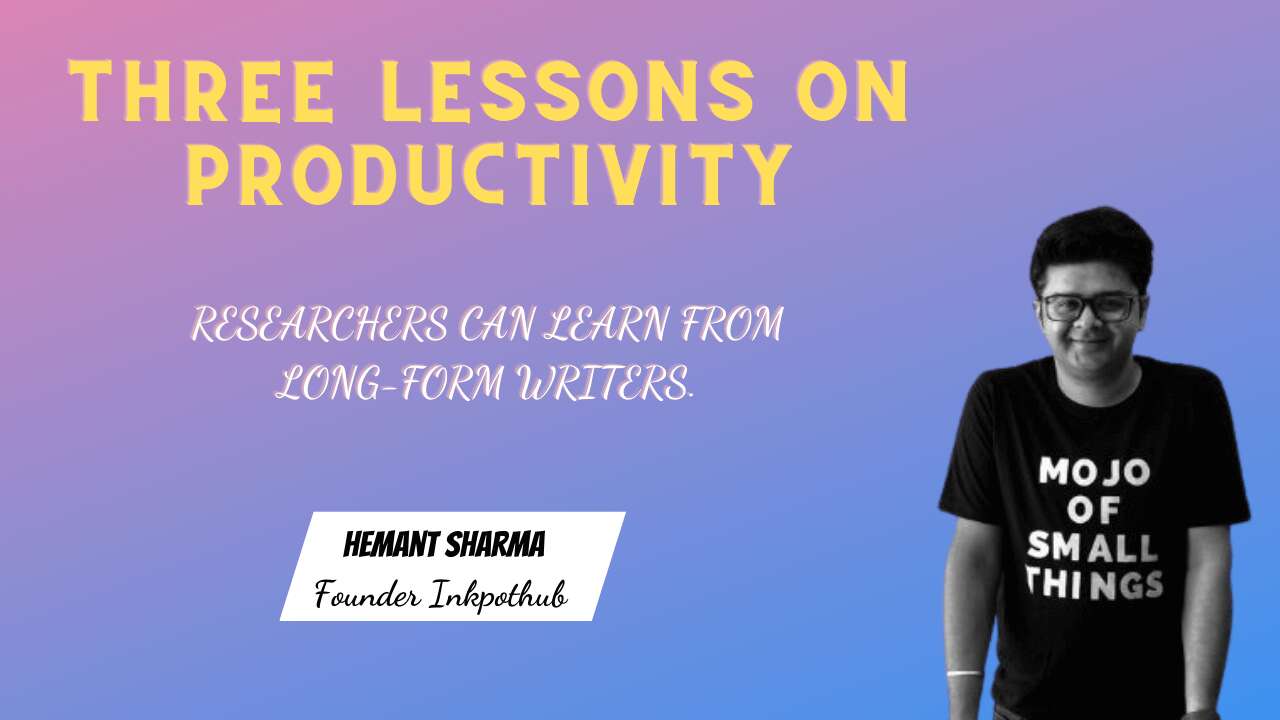Dear Writer
(Even if you are struggling but write, you are one).
As we approach the last part of a challenging year, let me congratulate you for walking into the new year with some serious expectations from yourself.
If you are somehow planning to write your thesis or a scholarly paper this year but struggling, we have something that can help.
Research is an arduous journey.
Long hours, long weeks, long years is all it takes (to say the least).
There is so much learning that happens and needs to happen during one’s doctoral journey. With only a few people around (well! Researchers are perceived as loners and werewolves (Oops!)), there are fewer people you can learn from.
But not anymore!
I discovered a secret from my doctoral journey (I dropped out) and my work with writing long-form (and on productivity).
Researchers can learn a lot about the process from their distant professional cousins – THE LONG FORM WRITERS.
Whether it is old school writers like JRR Tolkien (the famed author of the humongous ‘The Lord of the Rings and ‘The Hobbit’), C.S. Lewis or their famed assembly of writers called the ‘Inklings’; or the modern-day legends like Stephen King, JK Rowlings or Neil Gaiman – there is so much to learn from them that researchers can pick up and do wonders.
There are a few similarities between the two that you (and all of us) can benefit both.
Here are 3 (+1 bonus) lessons on productivity that you and your friend researchers can learn from long-form writers.
Lesson 1:
Everyone starts with a blank paper.
(You are not alone.)
A blank paper is your best friend and your arch-nemesis, for you can write whatever you want and struggle to write the first word simultaneously.
Every writer starts with a blank paper, irrespective of the prospective end product (a dissertation, a novel, a script, a book).
The most significant flex for a writer is to become so comfortable with the blank paper that they start every day and avoid being complacent about leaving it that way.
So many writers rely on routines, writing prompts, and closed group accountability groups – to sit in front of a blank paper and write.
You can do that too (and you must).
PRO-TIP:
Sit with a blank paper and write something anyway.
It will let your creative juices flow.
“Start writing, no matter what. The water does not flow until the faucet is turned on.”— Louis L’Amour.
Lesson 2:
Reading well is the preparation for writing well
“Read A Thousand Books And Your Words Will Flow Like A River.” – Virginia Woolf.
You cannot write if you don’t read. PERIOD.
This is the fact that all the authors have one thing in common – Huge Libraries (personal or access to).
The adage also supports this assertion,” Reading is to the mind, what exercise is to the body.”
If you can or do read and have writer friends, you have already done yourself a favor with equivalence to enrolling yourself for a creative writing course.
(Thank them by being honest with your craft).
Reading can help you find captivating and flawless writing; it enables you to understand the structure, sequencing, and succinct writing.
PRO-TIP-
Read the greats.
Read the masters.
Read voraciously.
Lesson 3:
Take small steps every day, and you will be able to go far.
“Amateurs sit and wait for inspiration; the rest of us just get up and go to work.” ― Stephen King (On Writing: A Memoir of the Craft)
Yes, 100 words per day.
Now, this may seem too less, but trust me, this is how books get written.
Writing every day, no matter how little, is what long-form writing is made up of.
Yes, there are exceptions wherein people have written best-sellers over a weekend.
While you can aspire to be an exception, it also takes a lot of work (read: small work done consistently).
BONUS
Lesson 4:
Get the first draft done as fast as you can.
“Almost all good writing begins with terrible first efforts. You need to start somewhere.” – Anne Lamott (Bird by Bird: Some instructions on writing and life)
Diving into the academic lexicon now (I rarely do it).
I made this mistake, and you don’t need to.
A few mediocre papers are much better than having many unfinished pieces (even though high quality).
Yes, you read it right.
You can always edit a mediocre paper and make it better, but you cannot create high-quality work on a blank paper in the first go.
Before I rest for the day, let me share once again – write every day, consider the blank page as your best friend, read and take small steps every day.
You will be good to go.
You can also write to me if that makes you go kicking.
Much love and Happy Writing.
Hemant
Inkpothub – Writing




